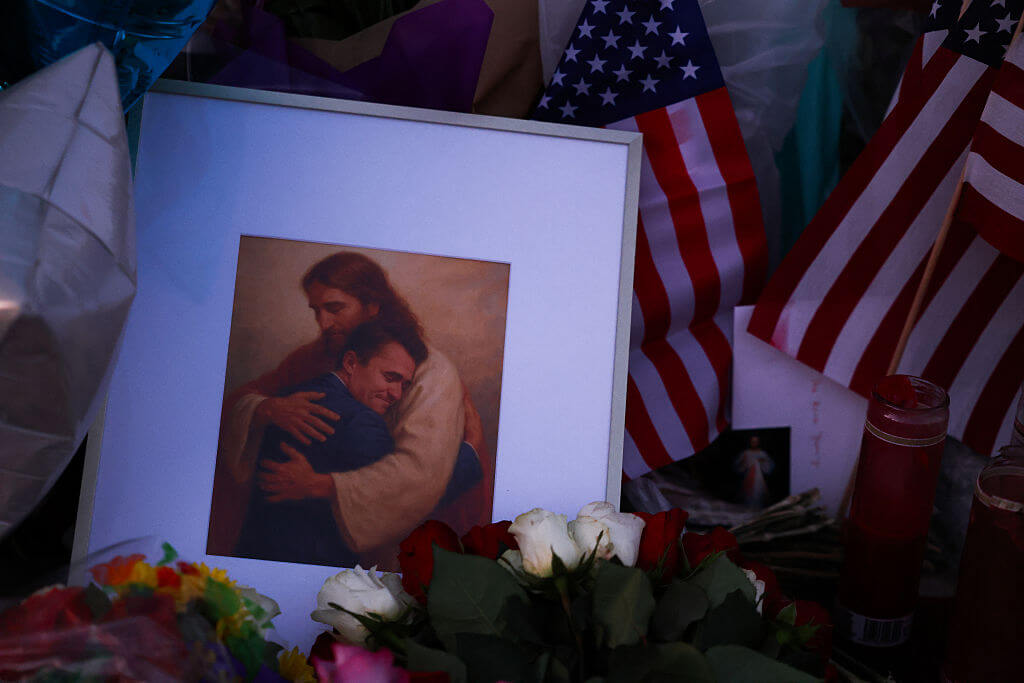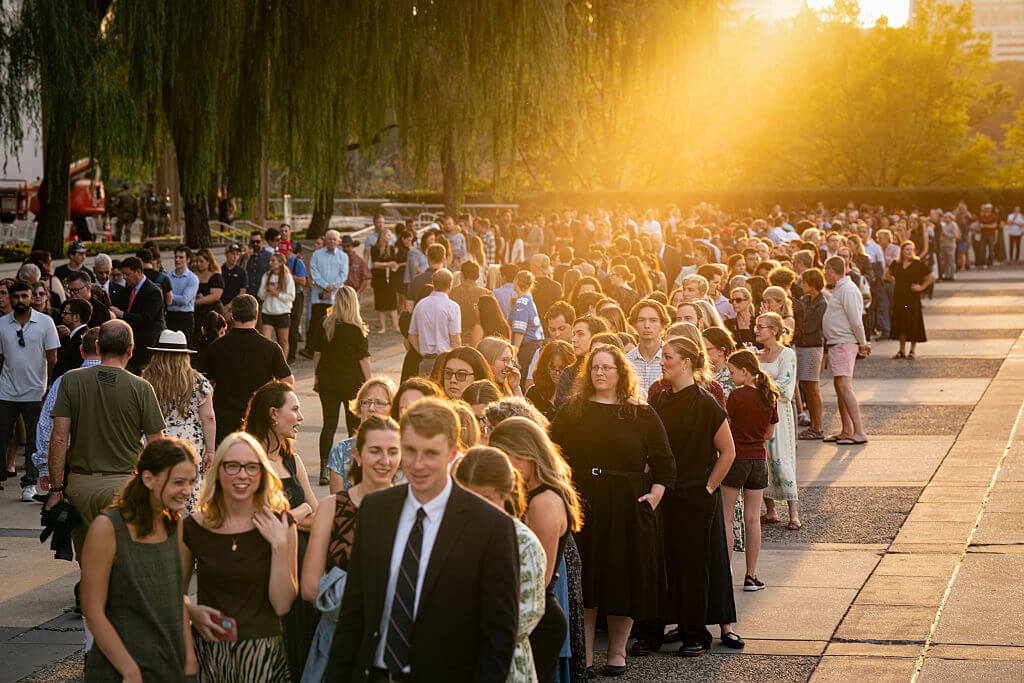Was Charlie Kirk a martyr? Here’s why Christians are divided and Jews should care
The Trump family and Republicans are sanctifying Kirk’s death as part of a spiritual war, but for Jews his canonization is more complicated

A makeshift memorial for Charlie Kirk outside of the Turning Point USA headquarters in Phoenix, Arizona, on September 14. Photo by Charly Triballeau/AFP via Getty Images
House Speaker Mike Johnson called Charlie Kirk a “happy warrior” and “a man of deep faith and conviction” at a prayer vigil that drew hundreds to the Kennedy Center in Washington, D.C., on Sunday night — including dozens of members of Congress. He told the crowd that Kirk’s “movement was a ministry,” rooted in the belief that “our rights do not derive from the state or a king. They come from the King of Kings.”
Johnson insisted Kirk’s work was not political but spiritual: “He was trying to save souls,” he said, describing the young conservative who was killed Wednesday as someone who reached out even to opponents because they were “lost, spiritually.” He closed with a prayer, commending Kirk as God’s “good and faithful servant.”
Authorities have not identified a motive in the killing. The alleged gunman, 22-year-old Tyler Robinson, has not been connected to any political group and is not cooperating with authorities, said Utah Gov. Spencer Cox. But that uncertainty hasn’t stopped religious and political leaders from casting Kirk’s death in theological terms.
The vigil, which drew Republicans, Trump administration officials and Kirk’s loyal followers, crystallized the narrative that has come to dominate the conservative universe in the days since his assassination: that he was more than a political activist — he was a martyr in an existential struggle between good and evil.
For Jews, this matters not because all Christians see Kirk the same way, but precisely because they don’t. His death has exposed a clash of theologies: Some evangelical leaders are casting him as a Christ-like martyr, while other pastors warn against sanctifying his politics. That debate, unfolding at the high levels of American power, raises questions for Jews about how comfortably language of religious martyrdom is being fused into the nation’s politics — and what that means for pluralism, dissent and the separation of church and state.
And Kirk’s canonization is complicated for Jews, too, because he was a champion of Israel and yet trafficked in antisemitic tropes. That tension also explains why Jewish leaders are watching closely as many of his supporters elevate him into martyrdom.
A martyrdom narrative
Kirk himself seemed to anticipate this storyline. On a podcast in June, when asked how he wanted to be remembered, he said without hesitation: “I want to be remembered for courage, for my faith. That would be the most important thing.”
After his death, his widow Erika leaned into that framing in a video posted on Friday. “Two days ago, my husband Charlie went to see the face of his savior and his God,” she said. “Now and for all eternity, he will stand at his savior’s side wearing the glorious crown of a martyr.”
Pastor Greg Laurie, a California evangelical who often shared stages with Kirk, told Fox News that Kirk’s faith was paramount: “The moment that Charlie took his last breath on earth, he took his next breath in heaven.”
The martyrdom language reached the Trump family, too: Eric Trump called the killing “a hit on Christianity; it’s a hit on religion.”

At the prayer vigil, Tulsi Gabbard, Trump’s director of national intelligence, compared Kirk to Martin Luther King Jr. She called protesters outside the Kennedy Center “empty” because of “their rejection of God, their desire to be God,” concluding that “they have made God their enemy.”
Robert F. Kennedy Jr., the health secretary, echoed the crucifixion of Jesus when he told the crowd, “Charlie gave his life so that the rest of us didn’t have to suffer those fates worse than death.”
Modern-day Christians ‘under attack’
The rhetoric taps into a familiar theme: modern-day Christian persecution. Despite being part of the nation’s largest faith group, many evangelicals frame themselves as under siege, their values under attack by secular culture and hostile elites. That posture reflects a deeper theological current: In the Gospels, the faithful are meant to be meek, humble and persecuted — Jesus came to aid the oppressed, not the powerful.
For American Christians in the majority, this posture creates a paradox. If they are not suffering, are they truly faithful? The solution has often been to interpret cultural slights, political debates, or in this case, Kirk’s death, as proof that Christians are besieged. Leaders like Johnson cast Kirk’s killing as a contemporary echo of the crucifixion itself, Jesus’ death as the archetype of righteous suffering.
That sense of embattlement has fueled fights over school curricula, abortion, and LGBTQ+ rights — themes Kirk himself often invoked when railing against progressives.
But some Christian theologians argue that canonizing Kirk as a martyr in a holy war strips the Gospel of its nuance. “Kirk himself — a Christian activist who opposed war in favor of a Gospel-centered peace — would have hated this kind of reaction,” Charles Camosy, a professor of moral theology at the Catholic University of America, wrote in an essay.
“I have no doubt that if Charlie had survived he would have wanted to meet with the person who tried to take his life, as St. John Paul II did, and offer him forgiveness,” Camosy continued. “He would have been curious about the person’s story and would have tried to use persuasion and the power of a genuine encounter to change his mind and heart.”
Up for debate
Bill Borror, a 65-year-old pastor and podcaster in Vermont, was also uncomfortable with the way Kirk’s death was being portrayed. Watching the wall-to-wall tributes, he heard something different. “He was a martyr for a cause,” Borror said. “I would not call him a Christian martyr.”
Borror’s critique carries weight precisely because it comes from outside the evangelical bubble. He leads a mainline Protestant congregation, is a gun owner himself and is married to a Jewish woman. The couple are also members of their local synagogue — a vantage point that makes him sensitive to both Christian and Jewish debates over martyrdom.
On Sunday morning, Borror’s church was unexpectedly full as he prayed for victims of violence — not just Kirk’s family but “the families of the kids shot at a Colorado elementary school last week, the families in Ukraine, the Middle East and Sudan.” He believes his fellow pastors should be the ones lowering the temperature when it comes to the country’s divisiveness. “I pray that we can be vessels of mercy in a really graceless age.”
In his view, the rush to beatify Kirk says more about America’s polarization than about Christianity. “He was a 31-year-old guy who still hopefully was going to evolve in his thinking,” Borror said in an interview.
To illustrate how views can shift over time, Borror pointed to his synagogue. After Hamas’ Oct. 7 attack, one congregant demanded harsh action against Palestinians. Nearly two years later, that same person has become critical of the Netanyahu government’s conduct of the war and grieves the loss of innocent life in Gaza.
For Borror, the example was a reminder that people’s perspectives are rarely fixed — and that Kirk’s, too, might have evolved had he lived. That possibility, he suggested, complicates the rush to define Kirk forever as either a saint or a sinner.
The Jewish lens
For Jews, the canonization of Kirk carries particular resonance. In Israel, tributes have been swift: a street named for him in the city of Netanya, a mural painted in Ashdod, even a missile inscribed “In memory of Charlie Kirk.” Prime Minister Benjamin Netanyahu called him “a lion-hearted friend of Israel.” (Concurrently, some online conspiracy theorists were blaming Israel for Kirk’s death.)
Yet Kirk’s own record was complicated. He cast himself as a defender of Jews and of Israel, but also trafficked in antisemitic rhetoric about Jewish bankers and the Great Replacement Theory. Many liberal Christians, and many Jews, recoiled at those comments.
The aftermath of Kirk’s death may reveal less about him than about the country that is now at odds over his legacy. For some, he is proof of a righteous war between Christianity and its enemies; for others, a reminder of how theology can be used to sanctify the powerful.
And for Jews, the stakes are especially high. The more American leaders normalize Christian martyrdom in public life, critics worry, the narrower the space can become for dissent — whether from liberal Jews who criticized Kirk, or from anyone who resists a politics cast in biblical terms. In a nation founded on the ideals of the separation of church and state, Kirk’s canonization may be seen by some as a warning that martyrdom is rarely simple — and almost always a reflection of the values of the day.
















